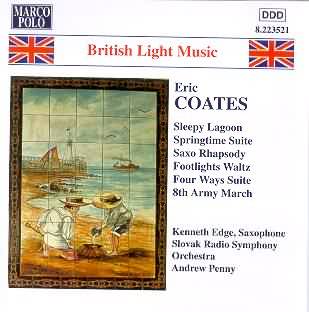These two albums of Eric Coates works have been released almost simultaneously.
The good news is that they both contain some interesting rarities that have
not been recorded in modern digital sound. Both programmes share some of
the same pieces.
I remember interviewing the composer's son, Austin Coates, many years ago
and he was adamant that Eric Coates liked his music taking at a brisk pace
he did not like it dragged out. Now the young conductor John Wilson who has
made a speciality of Eric Coates understands this well and his interpretations
capture the spirit of this music very well; in fact as many of my fellow
critics have observed his recordings sound almost as if Eric Coates himself
was conducting the pieces. His readings are much more joyful than those of
Penny. Penny's reading of the opening movement of the delightful Springtime
Suite (1937) is affectionate enough but it cannot capture that extra
charm that Wilson brings to it and Wilson has the expressive edge in the
meltingly beautiful "Noonday Song" which is the Suite's second movement.
Where Wilson does falter slightly is in his too fast tempi for the concluding
movement, "Dance in the Twilight", at his pace the dancers would surely do
themselves a mischief in the fading light?
High Flight (1956) was the last work that Eric Coates composed. Wilson again
wins with a faster, more stirring approach while Penny prefers to pull out
all the emotional stops with a rather stiff upper lip point of view. Where
Penny succeeds most is in the more relaxed romantic pieces. His Lazy
Night has a nice dreamy atmosphere which is just as satisfying as Wilson's
more hurried but nicely turned version.
Turning now to the other works on the albums and to the Marco Polo collection
first. The major work here is the Four Ways Suite. The first movement
North, is a march using the Scottish tune "Ca' the Yowes" which in
the Slovak Orchestra's hands is just a bit too careful and deliberate. The
Italian-sounding waltz that is the South movement is nicely shaped
and beguiling enough in Penny's hands and the East movement is even
more successful; it is a clever pastiche of oriental styles employing triangle,
xylophone, Chinese block and gong with some clever writing for the woodwinds.
The final movement, West, however, falls flat; the Slovak orchestra
just does not seem comfortable playing Eric Coates's jazz-orientated rhythms.
The other major work is Eric Coates haunting Saxo Rhapsody is nice
enough and Kenneth Edge plays up its bitter-sweetness very well but this
performance cannot compare with the ../graphics/classic 1968 EMI Studio 2 recording made
by Jack Brymer with the Royal Liverpool Philharmonic Orchestra conducted
by Charles Groves.
The CD opens with a graceful and lilting performance of By the Sleepy
Lagoon. A glowing rendition of the romance, Last Love, another
lovely piece is another plus point for Penny. His reading of the Footlights
Waltz has its charms too but it cannot displace my memories of Stanford
Robinson's exquisite touch with this enchanting little gem. Penny's 8th Army
March is rather stolid.
Now to the Wilson disc which has the more exciting programme and the best
performances.
The BBC Concert Orchestra plays immaculately throughout and they are, of
course, thoroughly attuned to this type of repertoire. The main item is the
ballet The Enchanted Garden (1938). This piece grew out of music Coates
had originally written for a stage production called "The Seven Dwarfs",
but then the Walt Disney film of Snow White and the Seven Dwarfs came
out and rather overshadowed it. Stanford Robinson, after much nagging, finally
persuaded Coates to recast the music to a story written by Eric's wife Phyllis.
Her story of The Enchanted Garden is of a Prince who has to leave
his beloved Princess at home in their garden under the protection of the
animals and birds who live there with them. But evil spirits invade
(characterised by a Tarantella which grows wilder and wilder) to threaten
the Princess who is saved just in time by the return of the Prince brandishing
a flaming sword. Peace and happiness are then reinstated. Wilson points up
all the exuberance, joy and charm in this, Coates's most opulent and extended
work, lasting about 20 minutes and brimming with detail and colour. It is
sco../graphics/red for the largest orchestra Coates ever wrote for - triple woodwind,
four horns, three trumpets, three trombones, harp and a full percussion section
and strings.
This CD opens with the march, London Calling which sweeps you along
and gets your toes a-tapping. Another march, The Seven Seas, with
its infectious rhythms, is a jaunty, salty and vibrant voyage in Wilson's
hands. There follows the Symphonic Rhapsody on "I pitch my lonely caravan
at night" based on one of Eric's own highly successful songs. Wilson
gives it the full-blooded Romantic treatment and listening to it I could
not help but think how appropriate it might have been for one of the Gainsborough
Studios "bodice-ripper" films of the 1940s. (Although Coates was not at all
happy about writing for films because of a tendency on the part of directors
to cut out scenes and loose music at the same time.) The programme also includes
another symphonic rhapsody on another song this time one by Richard Rogers
(the only time that Eric Coates arranged somebody else's music) - "With
a Song in my Heart" which is as much Coates as it is Rogers - Coates
gives it the full glamourous treatment which Wilson relishes. The earliest
piece is the wholly charming À la Gavotte a nicely-crafted,
sophisticated and elegant pastiche of eighteenth century styles. Finally,
there is the sparkling concert waltz, Dancing Nights lovingly played
by the BBC Concert Orchestra; nobody could resist joining the dancers to
this beautiful music.
Reviewer
Ian Lace
Penny: Performance

Sound 
Wilson: Performance
tar.gif)
Sound





